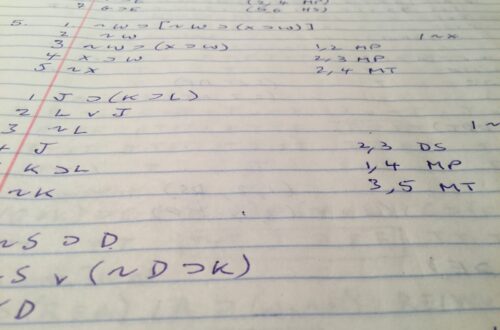Here is an old puzzle: Imagine a heap of sand. Now imagine taking one grain of sand off the top. It’s still a heap, right? Now keep going. At each removal of a grain the heap remains a heap until you get to one grain. One grain isn’t a heap so something changed. It’s just not clear when it changed. That’s vague.
Here’s another puzzle I wrote about the other day (I got it from Peter van Inwagen’s book, Material Beings). Imagine yourself as a freshly fertilized egg. Call it A. The single cell then becomes two cells, A and B. Now imagine that B fails to make it and A goes on to divide making A and C and so on. After grieving the loss of B it is reasonable to assume that A is you. But what if rather than A surviving, B survives instead? It would be equally reasonable to think that B was you. But now suppose that both A and B survive but that they become detached and go on to be identical twins. It appears that you would be both A and B. But that is absurd. Why is it weird? Surely whichever one survives is you and so what’s the problem? Well, consider Leibniz law. Leibniz law states that for any objects X and Y, if X is identical to Y then X has all the properties that Y has and Y has all the properties that X has. Furthermore, the law implies that X is always going to have to have the same properties as Y and vice versa. However, the problem seems to show that this law is not true or leads to bizarre results. Okay, so you are back to being a single cell, A. Now, before becoming A and B and C, both B and C were identical to A (A=B, A=C). After A becomes A and B, A was not identical to B ~(A=B), so even though A and B were at one time identical they became non-identical, so Leibniz law is false. But that doesn’t seem right either. Surely something that is identical is always identical. So enters vagueness.
According to Elizabeth Barnes, there are three kinds of vagueness. First, there’s the kind of vagueness that occurs when one’s expressions aren’t precise, though we know roughly what we mean. The term “heap” might be an example. We know roughly what we mean, but aren’t sure how many grains are are enough to warrant being called a heap. The word itself suffers vagueness. Second, there’s the kind of vagueness that happens when we just can’t know the precise conditions under which something is true. Is it a heap or isn’t it? Perhaps there is a precise point at which “it is a heap” is false we just can’t know it. This view is called epistemism and is advocated by Timothy Williamson who also thinks there is a precise cut off point at which a person goes bald, down to the last hair. His point is that we don’t have the epistemic equipment sufficient to know what it is. Finally, and perhaps most perplexingly, there may be such a thing as metaphysical vagueness. What if we had a determinative meaning for a heap and we knew what it was but still there remained an intrinsic vagueness?
Perhaps we need another story to demonstrate. The first two vagueness types seem to take care of the heap. Here are three more I borrow from Barnes: (1) Suppose you think that there is an object that is my shoe, but that there is not an object composed of my shoe and Donald Trump’s hair. Well, if you do think that, imagine a series of possible worlds in which there are two particles and nothing else. In World 1 the two particles clearly compose and object. In the next world, W + 1, they are slightly apart until in Wn they are at two ends of space. So, Barnes asks, which is the first world not to contain a complex object? Is there one and we just don’t know it or is there no which is the first world in which there is not a complex object?
(2) Suppose you think there is a difference between euthanizing someone and letting someone die. The difference is important because one gets you the electric chair and the other allows merciful relief for a sufferer. Now imagine a series of possible worlds in which there are very slight changes in activities of you, the doctor. In W1 you murder your patient; in Wn you compassionately let die. But at what point does the change take place? Which possible world is the first in which you let the person die rather than killing them?
Last one: (3) Suppose you think that personhood emerges as an embryo develops in the womb. There are gradual changes taking place as cells divide and a child emerges. According to your view, a non-person becomes a person at some point. The question, and it is a crucial one, is at which point does this occur? At one point a doctor clears out cells; at another she brutalizes and kills a person. So, when does the status change?
Plausibly, if one holds to any of these assumptions, one can be committed to metaphysical vagueness, a vagueness which is intrinsic to the entity or entities in question, something beyond lack of precision in language or epistemic limitations, something in the thing itself. One might suggest that there is such a thing as my shoe and Donald Trump’s hair. Conceivably, one could avoid vagueness by saying that at every point the two particles are an object. One might solve it by going the other way. Perhaps there is no such thing as a complex object (or “concrete particular”). Perhaps there are only simples or particles and no tables, shoes, or people. Instead there are just particles arranged table-wise etc.
If you believe that persons are identical to their souls, then (3) is not so difficult. There is a definite point at which the person begins to exist: at the point that the soul begins to exist. When might that be? I can’t see any reason to date it earlier than conception. However, absent a soul, the person is a collection of cells that gradually increases in size. Whatever point at which you deem the collection to be a person is arbitrary. Your best bet is to say the same – conception, but that would make abortion very difficult to defend (though, bizarrely, there are now abortion advocates who recognize personhood, but lessen his or her value such that the person becomes disposable).
There are good reasons to reject metaphysical vagueness and think that the semantic and epistemic versions are adequate to explain the apparent heap paradoxes (or sorites paradoxes). Here are a couple of reasons:
First, logic, as traditionally understood, is not vague. Propositions are either true or false not somewhat true or somewhat false. In order to accept metaphysical vagueness one must accept alternative, fuzzy logic with its gradations of truth values. On this view, the rule of the excluded middle is denied. That seems to me to be a high cost.
Second, theism gives me extra resources not available to the naturalist. Though vagueness of the semantic and epistemic sort, plagues the finite capacities of human beings, it never bothers God. God’s comprehensive knowledge of the universe ensures that vagueness never goes ontic. Though there is lack of comprehension in us, there is no such thing in God. If God comprehends something we can’t there is no intrinsic vagueness. Consequently, there is no obligation on us to comprehend everything or to doubt that we can know anything. Rather, there are limits set by design. We are designed by God to stop short in some way. Metaphysics, the comprehensive catalogue of creation is not possible for us and will probably always elude us.
The later point is important for Christians. A common criticism of Chritian belief is that it has within it some paradoxical claims particularly about the Trinity and the incarnation. It is claimed that those doctrines are paradoxical and therefore false. A good response is to say that it is not only God who is incomprehensible but also his creation (note: the doctrine of God’s incomprehensibility is standard doctrine and so it should be conceded that there are aspects of the divine that are beyond our finite understanding). It is no good saying that the doctrine of the Trinity should be rejected because it is paradoxical if the doctrine of material constitution is similarly tricky to parse. Vagueness goes with human territory but it doesn’t have to go with God’s territory (his perspective). One could also argue that God’s ability to comprehend himself (God does not find himself incomprehensible) and his creation underwrites our limited ability to comprehend reality according to the knowledge and ability he grants us. Christian metaphysicians should be far less anxious than there naturalist counterparts when they discover that their metaphysic produces a paradox. Appeal to vagueness might even be a Christian virtue! (if this point interests you. I recommend a visit to proginosko.com, James Anderson’s blog and his book Paradox in Christian Theology).


